7 Middle East and North Africa
Japan depends on the Middle East and North Africa region for approximately 90% of its crude oil imports, and the region, as a global logistics hub, is critically important from the perspective of Japan’s economy and energy security. In addition, with a high population growth rate and an increasing youth population, it is expected to have a high potential for future growth.
At the same time, the Middle East and North Africa region faces various destabilizing factors and issues. Most recently, the humanitarian situation in the Gaza Strip has become extremely dire due to the military developments following the terror attacks on Israel by Hamas and others on October 7. Furthermore, the escalation of tensions over Iran and the wave of refugees and internally displaced persons from ongoing armed conflict in Syria are seriously affecting the stability of the neighboring countries and the entire region. After the Taliban’s takeover in Afghanistan in August 2021, humanitarian needs have increased in the country as well as in neighboring countries. The risk of proliferation of violent extremism such as the “Islamic State of Iraq and the Levant (ISIL)” still remains in various places. Moreover, in recent years, the region has also been hit by a series of natural disasters, raising concerns about their impact on the humanitarian and security situation.
As a responsible member of the international community, Japan has made significant contributions to peace and stability in the Middle East and North Africa region through ODA and other means. Building on the good relationships it has developed with Middle Eastern countries, Japan will continue to make active diplomatic efforts to ease tensions and stabilize the situation in the region.
● Japan’s Efforts
Peace and stability in this region are extremely important for the stability and prosperity of the international community as a whole, including Japan. Thus, there is a need to provide support in various areas such as economic assistance and human resources development to achieve sustainable peace and stability in the region.
■ Support for Syria, Iraq, and the Neighboring Countries
With regard to the Syria issue, which is a pressing concern for the international community, Japan announced at the seventh Conference on “Supporting the Future of Syria and the Region” (Brussels VII Conference) held in June 2023 that it had decided to contribute approximately 220 million US dollars, including approximately 40 million US dollars in humanitarian assistance in response to the earthquake that occurred in the southeastern part of Türkiye in February. Also, Japan reiterated its determination to continue to provide assistance in line with the needs of the Syrian people and neighboring countries. This assistance includes humanitarian aid and support for social stabilization for Syria and its neighboring countries (see “Featured Project” regarding support for Syrian refugees).
As for Iraq, Japan provides assistance in the forms of yen loans and other means in the oil and gas sector, which are the foundation of Iraq’s economy, and electricity, water, and sewage, which constitute basic lifeline services. Also, Japan assists in strengthening governance in Iraq with the aim of helping Iraq develop independently as a stable, democratic state.
Since the outbreak of the Syrian crisis in 2011, the total amount of Japan’s assistance to Syria, Iraq, and the neighboring countries has reached approximately 3.5 billion US dollars. In the region where the humanitarian situation is always fluid, Japan provides timely and effective assistance (see also Part III, Section 2 (1)).
Under the Japan-Jordan Partnership Program (JJPP), Japan conducts training for human resources development for nationals of Iraq and other neighboring countries in Jordan, which plays an important role in accepting Iraqi refugees and supporting Iraq’s reconstruction. In addition, Jordan has accepted many Syrian refugees since the beginning of the Syrian crisis in 2011, and, as support for the refugees and the communities hosting them, Japan supports the rehabilitation of waterworks facilities for a stable water supply and efficient and effective use of water resources to alleviate water shortages due to population growth. In September 2023, a signing ceremony was held for a loan of an approximately 100 million US dollars (15 billion yen) for electricity sector reform and grant aid of 897 million yen for stable electricity supply.
Moreover, Japan supports human resources development and self-reliance of refugees. For example, as part of the effort to train Syrian nationals for reconstruction in the future, from FY2017 to December 2023, Japan accepted a total of 136 Syrian students under the “Japanese Initiative for the future of Syrian Refugees (JISR)”Note 19 and the Japanese Government Scholarship program.
Featured Project 11
JordanPublic nomination
Protecting the Dignity of Syrian Refugees through Self-Reliance Support
—UNHCR Activities—
Protecting Refugees in Jordan
The ongoing Syrian crisis, which started in 2011, has displaced 6.8 million people inside Syria and forced 5.2 million to flee to neighboring countries. Jordan,Note 1 a neighboring country where more than 650,000 Syrians have taken refuge, is known for its open-door policy for refugees. In Jordan, refugees are guaranteed basic public services. For example, the country responded flexibly to the spread of COVID-19 by including refugees in its national vaccination program. However, refugees still face a number of difficulties due to a chronic shortage of humanitarian funding and economic exhaustion. The needs of the refugees are also diversifying as their stay in Jordan is prolonged.
Responding to the situation, the United Nations High Commissioner for Refugees (UNHCR), with financial contribution from Japan, is helping protect the lives and dignity of Syrian refugees residing in Jordan. UNHCR’s efforts include training refugee volunteers to carry out protection activities in their communities and working with local women’s organizations to provide income opportunities so refugee women can improve their livelihoods and become more self-reliant.
UNHCR also provides monthly grants to vulnerable refugee families. Ms. SAWADA Mei, a UNHCR Jordan official, says, “Providing grants so families can meet their daily needs is an important form of support that helps refugees become self-reliant and economically active. It can revitalize the local economy as well.” In 2023, UNHCR provided grants to approximately 250,000 people and received grateful responses from recipients, including, “We were able to buy food, pay rent, and cover children’s medical and education expenses with the assistance.”
To ensure that the needs of each individual who is forced to flee their homes are met in an appropriate and timely manner, UNHCR, in collaboration with partner organizations, continues to provide humanitarian assistance under the motto “stay and deliver.”
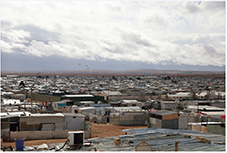
Za’atari Refugee Camp, home to more than 80,000 refugees, was set up by UNHCR in cooperation with the Government of Jordan (Photo: UNHCR)
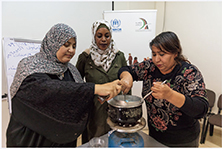
Syrian refugee women learning to make soap as part of a livelihood improvement program at a community center in the capital Amman (Photo: UNHCR)
Note 1: Jordan hosts the world’s second highest number of refugees per capita.
■ Assistance to Yemen
Yemen faces the “world’s worst humanitarian crisis” with approximately 80% of its population in need of some form of humanitarian aid due to the prolonged conflict. In this context, since 2015, as a major donor country, Japan, through international organizations, has provided a total of approximately over 400 million US dollars in humanitarian aid to the country. In 2023, in addition to the humanitarian aid through international organizations, Japan continued to provide education and training in Japan by accepting Yemeni students through the Japanese Government Scholarship program and conducting training for Yemeni experts through JICA, in order to foster human resources to back up Yemen’s self-reliant stabilization. Furthermore, for the purpose of creating an environment where people can engage in economic activities, Japan supports road rehabilitation in the city of Aden and provides equipment for mooring an alternative facility where oil can be transshipped from the Safer, a floating storage and offloading facility at risk of spilling oil due to leakages caused by aging.
■ Assistance to Afghanistan
Even after the Taliban’s takeover of Kabul in August 2021, international organizations and NGOs have continued to operate in Afghanistan, and the international community has provided considerable support. However, the country’s humanitarian situation remains a serious concern, due in part to the impact of the Taliban’s oppressive policies, including greater restrictions on the rights of women and girls. Against this background, Japan, in cooperation with the international community, has continued to urge the Taliban to improve the situation. In parallel, Japan has announced a proactive humanitarian aid policy in international fora, including the G7 and the UN Security Council, and has emphasized the importance of bringing stability to Afghanistan.
Specifically, since August 2021, Japan, through international organizations and NGOs, has provided assistance in areas such as shelter, health, water and sanitation, food, agriculture, and education. This includes enhancing agricultural production and promoting community-led irrigation through the Food and Agriculture Organization of the United Nations (FAO), as well as improving women’s livelihoods through the United Nations Development Programme (UNDP). In addition, immediately after the earthquake that occurred in western Afghanistan in October 2023, Japan, through JICA, provided emergency relief goods. Furthermore, as the damage continued and expanded, Japan provided Emergency Grant Aid in sectors such as food and health.
Since 2001, Japan has offered a wide range of development assistance to Afghanistan in support of the country’s sustainable and self-reliant development, including the organization of two ministerial-level meetings (2002 and 2012) and the provision of support to various sectors such as humanitarian relief, health, education, agriculture and rural development, and women’s empowerment. With regard to future assistance to Afghanistan, Japan will work closely with the international community and respond appropriately after carefully assessing the needs of the Afghan people while keeping in mind the establishment of a self-reliant economy and the promotion of women’s empowerment.
■ Middle East Peace (Assistance to Palestine)
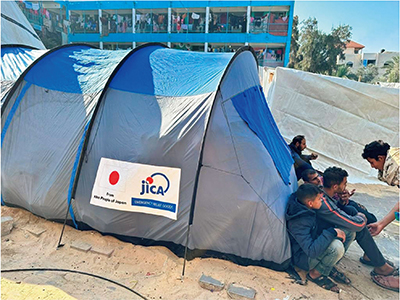
A tent provided through JICA (Photo: JICA)
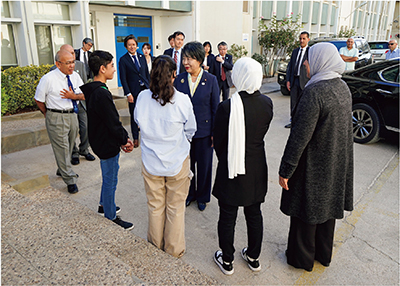
Foreign Minister Kamikawa in conversation with three Palestinian junior high school students from the Gaza Strip during her visit to the Middle East in November
Japan has prioritized assistance to Palestine as one of the key policy pillars of its contribution to the Middle East peace, and has provided more than 2.3 billion US dollars in assistance since the 1993 Oslo Accords. Specifically, Japan has provided various types of humanitarian assistance through international organizations and NGOs to improve the harsh living conditions of the socially vulnerable in the West Bank, including East Jerusalem, and those affected by conflicts in the Gaza Strip, Palestine. In March 2023, Japan provided approximately 24.77 million US dollars in grant aid through international organizations, and in August, it provided Emergency Grant Aid of 1 million US dollars through the United Nations Relief and Works Agency for Palestine Refugees in the Near East (UNRWA) to support the Jenin refugee camp in Palestine, which was severely damaged by Israeli military operations. Moreover, in September, Japan provided grant aid in the amount of 200 million yen through the World Food Programme (WFP) for improving food security and contributing to the solution of development challenges in Palestine.
Japan is also engaged in a wide range of efforts, so as to stabilize and improve the daily lives of Palestinians, strengthen the fiscal position, and enhance the quality of administration aimed at preparing for a future Palestinian state-building and for a self-reliant Palestinian economy. In February, JICA announced the signing of a 30-million-US-dollar subordinated loan agreement with the Bank of Palestine, a major private financial institution in Palestine. This loan is the first Private-Sector Investment Finance project in Palestine, and is expected to contribute to improving access to finance for micro, small, and medium enterprises by expanding the Bank of Palestine’s loan portfolio. Additionally, in September, the Exchange of Notes (E/N) on Grant Aid of 2.793 billion yen for the renovation of water distribution facilities in Jenin municipality in the West Bank of Palestine to improve water supply service was signed.
Following the terror attacks on Israel by Hamas and others on October 7, the Israel Defense Forces began a military operation in the Gaza Strip, and the humanitarian situation considerably deteriorated. In October, Japan extended Emergency Grant Aid of 10 million US dollars in sectors such as food, water, and medical care through UNRWA and the International Committee of the Red Cross (ICRC). On November 3, during her visit to Palestine, Foreign Minister Kamikawa announced Japan’s plan to provide additional assistance of approximately 65 million US dollars to Palestine and supplies to the Gaza Strip. Putting this into practice, Japan, through JICA, worked with the Egyptian and Palestine Red Crescent Societies, and UNRWA to deliver relief supplies such as tents and blankets to the Gaza Strip, and also through the Japan Platform (JPF) provided 600 million yen (approximately 4.4 million US dollars) in humanitarian assistance such as food, daily necessities, health and medical care, water, and sanitation. In addition, approximately 8.3 billion yen (approximately 60 million US dollars) was allocated as part of the FY2023 supplementary budget for humanitarian assistance in the areas of food and nutrition, maternal and child health, medical services, and other areas through international organizations (including UNRWA, WFP, and the International Federation of Red Cross and Red Crescent Societies (IFRC)).Note 20
■ Assistance to the North Africa Region
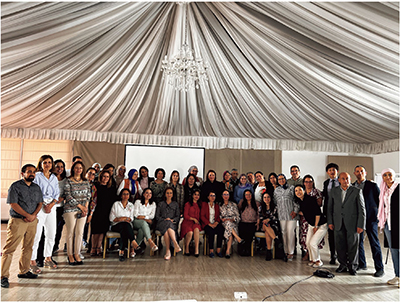
KAIZEN training on hospital management conducted by Japanese experts for medical professionals working at public hospitals in Tunisia (Photo: JICA)
In Egypt, under the initiative of President El-Sisi, the Japanese-style education system from early childhood through to higher education has been introduced. In addition, Japan provides Egypt with a combination of grant aid, yen loans, and technical assistance across a wide range of sector interventions, including transportation infrastructure projects such as the Greater Cairo Metro Line No. 4 and Borg El Arab International Airport, support in fields of agriculture and irrigation, the construction of the Grand Egyptian Museum (GEM), and the conservation and restoration of artifacts at the GEM. In April 2023, Prime Minister Kishida visited Egypt and held a summit meeting with President El-Sisi, and the Exchange of Notes (E/N) for a yen loan of up to 100 billion yen for the “Greater Cairo Metro Line No. 4 Phase 1 Project (III)” was signed. In addition, the two leaders confirmed the steady progress of Japan’s assistance through ODA, including the cooperation regarding strengthening food security, the promotion of Japanese-style education in the education sector, the acceptance of 150 foreign students, mainly doctoral students, at the Egypt-Japan University of Science and Technology (E-JUST), and cooperation regarding the GEM.
Libya is a resource-rich country with the largest oil reserves in Africa. However, it has not been able to break away from the prolonged pattern of conflict and political turmoil, which has become an element of instability in the region, including the refugee issue. In September, heavy rains and dam bursts caused floods in the eastern part of the country, resulting in considerable casualties, suffering, and property damage. In response, Japan provided emergency relief goods such as tents, blankets, and water purifiers, as well as emergency humanitarian assistance, including Emergency Grant Aid totaling 3 million US dollars (411 million yen) through the International Organization for Migration (IOM) and the United Nations Children’s Fund (UNICEF) and food aid of approximately 1.6 million US dollars.
Morocco was battered by the earthquake disaster that occurred in the central region of the country in September. Japan, through the IFRC, provided an Emergency Grant Aid of 2 million US dollars, including shelter and food, and also decided to deliver 1 million US dollars in disaster assistance in partnership with Japanese NGOs via the JPF.
- Note 19: This is one of the support measures for the Middle East announced by Japan in May 2016, which aims to provide educational opportunities to Syrian youths who have been deprived of the opportunity to attend school due to the crisis. In cooperation with the United Nations High Commissioner for Refugees (UNHCR), Japan implements the measure for Syrian youths who have fled to Jordan and Lebanon as refugees.
- Note 20: Following the discovery on January 26, 2024, of allegations that UNRWA staff members had been involved in the terrorist attack, on January 28, Japan suspended its funding to UNRWA (approximately 35 million US dollars) as part of its support for Palestine.
